#social fascism
Text
“In such circumstances the tension between Ernst Thälmann’s footdragging on the issue of nationalism and Moscow’s priorities came to a head over the tactics to adopt when the Nazis forced a plebiscite to oust the social democratic government of Prussia. The vote was due on 9 August 1931. Under Thälmann’s direction, on 15 July the Kommunistische Partei Deutschlands leadership decided as a matter of principle to abstain. Any association with the Nazis was ruled out. Even the more radical Heinz Neumann appeared to go along with the decision. “Some” of the comrades in Moscow at Comintern’s secretariat also thought this the correct line to take: probably the moderate Kuusinen and doubtless the sinuous but not unintelligent Manuilsky. But as soon as word spread, others—probably the leftists Pyatnitsky and Vil’gel’m Knorin, egged on by Neumann—appealed over the heads of the German leadership to Stalin.
...
The Prussian plebiscite proved a dangerous fiasco that destroyed any chance of a united front against fascism in Germany and yet failed to make the KPD a credible voice for nationalism. A great victory was declared by Comintern and the KPD—Neumann, indeed, claimed that the central government and the Prussian administration were now “peeing in their pants”—even though insufficient numbers voted to oust the SPD from power in Prussia. All this did was to alienate social democrats even further, and not just them. The shortfall was attributable not least to the fact that core Communist districts failed to participate. This was, indeed, a serious matter. Most supporters of the KPD were simply unwilling to throw out the socialists. The doctrine of social fascism was thus effectively being ignored among the rank and file of the party. Stalin’s opportunism had tipped the largest Communist party in Europe, and therefore Moscow’s best asset, into prolonged crisis.
...
Before long Manuilsky could be heard acknowledging that fascism had not been blocked in Germany as “some comrades” had asserted, and that “in fact in no country had the growth of fascism been brought to a halt”. Worse still, the party in Germany appeared to be all over the place. On 17 November 1931 the KPD daily Die Rote Fahne spoke of Social Democracy as the main menace. Five days later it named the Centre Party. Comintern’s German policy was in tatters. But the underlying reason for the chaos was unmentionable, even within the walls of Comintern: Soviet state interests, as conceived by Stalin, had to be served. At all costs the Centre Party and the Social Democratic Party of Germany had to be removed from the levers of power or the convergence between debt-ridden Germany and the Entente would continue, leaving Moscow isolated and therefore vulnerable to the emergence of a hostile coalition.
The KPD was lambasted for not doing enough to combat the Nazis, who were seen by the party as fundamentally “anti-capitalist” and passively making gains on the back of dissatisfaction with government. They were seen as doing a better job of exploiting discontent, the implication being that the Communists should learn from them. Indeed, Thälmann made a Freudian slip in rating Hugenberg’s nationalist party against “the not so right-wing [sic] party of the Nazis”. Inevitably the KPD was bewildered and demoralised by signals from Moscow. As late in the day as 10 April 1932 Stalin was still insisting that “the main blow” should be aimed at Social Democracy. And this was after the presidential elections of 12 March, when Hitler obtained 30.1% of the vote against Thälmann’s tiny 13.2% and Hindenburg’s 49.6%.
The disconcerting spectacle all too visible to Comintern was that the Nazis were making alarming headway in recruiting from workers in enterprises where the Communists had been predominant. It soon became obvious where former KPD activists were going. KPD party membership rose as never before, but these were new members. Moreover, the numbers voting Communist in key working-class districts of Berlin such as Wedding and Friedrichshain were lower than in the May 1928 elections. All of this was cause for “serious alarm”. In this respect Thälmann’s speech to Comintern’s executive committee on 19 May was scarcely reassuring.
Thälmann was inevitably depressed by the outcome of the elections. It was a defeat generally recognised as such within Comintern, despite Pyatnitsky’s attempts to lighten the blow with reassuring denials. Yet Thälmann clearly understood that his hands were largely tied by Comintern’s commitment to the doctrine of social fascism. The KPD could not block the election of a Nazi to the Prussian Landtag “because it is not permissible to enter into horsetrading with Social Democracy and even less with the Centre as the governing party”. Moreover, his analysis of the Nazi Party and its growing popularity was bleak but spot-on:
The question is: why has the National Socialist Party such a colossal following? It is not only a question of the party being so active. It is not only a question of it conducting massive agitation and propaganda; it is not only a question of the millions provided by the bourgeoisie for these elections and other elections; but it also has to do with the existence of chauvinist and nationalist sentiment in Germany.… The Hitler movement positions itself as the movement that fights against the system and enables it to mobilise expressions of discontent and anti-capitalist opinion in Germany (general opposition to the Versailles system is also very strong) into their ranks.
...
Even diehards at Comintern headquarters momentarily began to suspect that they might be on the road to catastrophe when a new coalition government emerged on 1 June 1932 under the leadership of Franz von Papen for the Centre Party. With defeat staring him in the face, Knorin, the ultra-leftist heading Comintern’s Central European secretariat, panicked and raised the alarm:
Our party must now make every effort to reorganise itself in expectation of being outlawed. History has never known an instance of an 800,000- member party being forced underground. But we are now faced with … such a possibility.
Knorin now openly admitted that
Germany has a decisive significance for Comintern. Should fascism succeed in wiping out the resistance of the working class, should fascism succeed in forcing our party underground for a long time … then this would mean a colossal growth of the reactionary camp, it would mean fascism across the face of Europe.
Indeed.
...
On 4 April 1932 Stalin had told Thälmann’s nemesis, Neumann, that he was preoccupied with military matters and that left no time for Comintern. At this stage of the Depression other governments were increasingly sensitive to Comintern activity because of its international reach, even though the organisation was at its most sectarian and was therefore losing rather than gaining members. In May the Swiss minister in Rome had an audience with Mussolini, who in a bid to dominate the table played the anti-Communist card:
He told me that the four European great powers, France, Germany, England, and Italy, have to restore order in Europe; otherwise we are heading for one of the most serious social crises, the bolshevisation of Europe. Bolshevik propaganda is pervasive everywhere in all guises. Our bourgeois class is itself completely penetrated. Throughout Europe, not excluding Italy, the working class is convinced that the Bolshevik régime has succeeded.
It is by no means certain that knowing this would have reassured the Soviet leadership; rather the reverse is possible. The common fear of Bolshevism without doubt cemented relations between the antagonistic capitalist powers. Secret intelligence indicated that the German government was seeking common ground with the French at Soviet expense. Indeed, at the Lausanne conference of the major European powers on 29 June Papen, who counted on the Americans to ease reparations payments, proposed military conversations with the French for common action against the Soviet Union—a proposal that was, no doubt to Stalin’s relief, dismissed out of hand. Anxious not to make matters worse, given Papen’s fierce anti-Communism, Stalin vented his fury at “disastrous” attacks launched on the Papen government by the Soviet press. The consequences of his immediate priorities soon became apparent.
Comintern’s secretariat was largely on its own. It was frozen in place by Stalin’s previous decisions without any flexibility permitted to improvise policy for the KPD. In addition, Stalin’s habit of confiding in Neumann, who had nominally been in the dock since the spring of 1930 over his ultra-leftism, seriously undermined the authority both of Comintern’s secretariat and of Thälmann. Only shortly after he had made the case for anticipating a fascist coup Knorin, along with Pyatnitsky, refused to go along with a proposal made by Thälmann, who wanted to stop the election of a Nazi as chairman of the Prussian parliament even by means of voting for a socialist or Centre Party candidate and had the agreement of the majority within Comintern’s secretariat.
In Moscow the heightened vigilance during that summer proved all too brief. It dropped precipitously when the Reichstag elections on 6 November 1932 fortuitously delivered a rise in votes for the KPD and a fall in support for the Nazi Party. This inevitably sent a welcome wave of euphoria through Comintern and the German Communist leadership, who were now tempted to believe that the crisis was finally past. It proved a fatally beguiling mirage. One clue to the staying power of unrealism was the obviously demoralising consequence of acknowledging how far policy hitherto had been misdirected.”
- Jonathan Haslam, The Spectre of War: International Communism and the Origins of World War II. Princeton & Oxford: Princeton University Press, 2021. pp. 121-127.
#kommunistische partei deutschlands#comintern#weimar republic#weimar germany#crisis of the weimar republic#international relations#communism#soviet union#ernst thalmann#franz von papen#lausanne conference#national socialism#social fascism#nsdap#german politics#stalinism#german history#academic quote
1 note
·
View note
Text


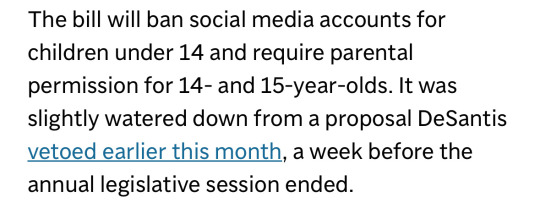
Source
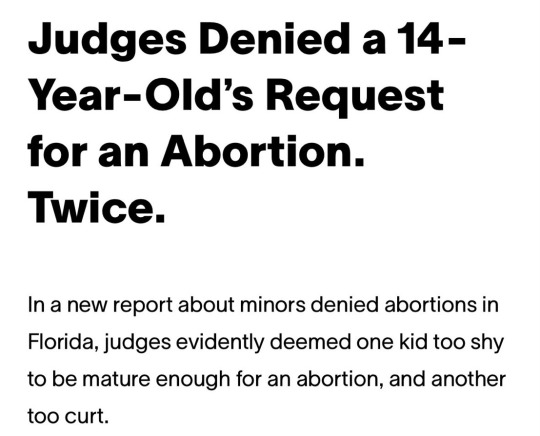
Source
At age 14 in Florida, a child is “too young” to use social media but old enough to give birth
621 notes
·
View notes
Text
Okay I'm riled up about this rn so time for a history of economics lesson (rant) from me, a stranger on the internet
I'm a communist, I hate capitlism, so lemme just put that out there. But capitlism had its moments. Even marx had some praise for parts of capitlism.
And by far the most successful form of capitlism was Keynesian economics, as evident by the enormous increase in living standards in those countries which adopted it between the 1930s and 1970s.
What's Keynesian economics? The idea that capitlism can't survive on its own, and must be supported by government spending at the poorest ends of society and taxes at the richest ends of society (essentially the opposite of trickle down economics) as well as strong regulations on certain industries like banking.
It basically started in 1936 with President Roosevelt who was a personal friend of John Keynes (who the theory is named after).
Roosevelt implemented Keynesian economics to great effect; he raised the top tax rate to 94% (he actually wanted a 100% tax rate on the highest incomes, essentially creating a maximum wage, but the senate negotiated down to 94%) and similarly high corporate tax rates, he created the first ever minimum wage, created the first ever unemployment benefit, created social security in America, pension funds, and increased public spending on things like public utilities and infrastructure, national parks, etc. Which created about 15 million public sector jobs.
This ended the great depression and eventually lead to America winning world War 2, after which many countries followed suit in implementing similar policies, including UK, Australia, and NZ (apologies for the anglosphere-centric list here but they're the countries I'm personally most familiar with so bare with me)
Over the next 40 years these countries had unprecedented growth in living standards and incomes, and either decreasing or stable wealth inequality, and housing prices increasing in line with inflation. Virtually every household bought a car and a TV, rates of higher education increased dramatically, america put a man on the moon, and so on.
Then it all abruptly ended in the 80s and the answer is plain and obvious. 1979 thatcher became UK prime minister. 1981 reagan became US president. 1983 the wage accords were signed in aus. 1984 was the start of rogernomics in NZ (Someone link that Twitter thread of the guy who posts graphs of economic trends and points out where reagan became president)
(Also worth noting those last two in NZ and Aus were both implemented by 'left' leaning governments, but they are both heavily associated with right wing policies.)
This marked the beginning of trickle down economics: tax cuts, privatization of publicly owned assets, reduction in public spending, and deregulation of the finance sector. The top tax rates are down to the low 30s in most of these countries, down from the 80s/90s it was prior. Now THATS a tax cut.
And what happened next?
Wages stagnated. Housing prices skyrocketed. Bankers got away with gambling on the economy. Public infrastruce and utilies degraded. And wealth inequality now exceeds France in 1791.
I don't know how anyone can deny the evidence if they see it, but there's so much propaganda and false information that a lot of people just don't see the evidence.
Literally all the evidence supports going back to Keynesian economics but now that the rich have accumulated so much wealth it's virtually impossible to democratically dethrone them when they have most of the politicians on both the right and the left in their pocket.
Unfortunately it was the great depression and ww2 that gave politicians the political power to implement these policies the first time around. Some thought the 2008 crash would spur movement back towards Keynesianism (which it actually did in Iceland, congrats to them), I hoped covid would force governments to now, but nope.
All these recent crises' seem to have just pushed politics further and further right, with more austerity and tax cuts.
I don't really have a message or statement to end on other than shits fucked yo.
#also this is purely talking about the economics side of things#i know pre-80s the social side of politics was fucked despite the increasing living standards#with jim crow laws ans segregation and countless anti-queer laws etc.#and i know you canr seperate the economy entirely from social aspects of politics#but for the purposes of this post this is about the theoretical implications of different forms of capitlism#thats also why im not mentioning the recent descent towards fascism even tho it is closely tied to the economy#anyway#so yeah ive been reading a lot on economics lately#capitlism#economy#Keynesian economics#communism
5K notes
·
View notes
Text
Elon Musk has turned 𝕏 into a right-wing hate network, with violent racism and transphobia... Unlike its competitors such as Gab and Truth Social, 𝕏 is successful in normalizing white supremacist ideologies because of the large userbase it inherited from Twitter. A userbase that, when you post on 𝕏, includes you.
Here's a site to help organizations and people move on from X-Twitter.
108 notes
·
View notes
Text


#second pic was obtained during my field research in a nazi channel posted unironically ofc#pagans#larpers#nazis#national socialism#fascism#tw disney mention#tw larpers#tw cringe#tw embarrassing#funny#found#e anthropology
91 notes
·
View notes
Text
Rewatching Bo Burnham's Inside.
I'm never ever gonna get over how everyone watched this and wrote essays and how even liberals were watching it and how white people STILL posted tiktoks about how THEY were socko (a clear representation of PoC experiences in liberal spaces) and now people are like vote for Joe Biden!!
Like I???????
these people could literally have the problem blasted directly into their fucking brains and treat it like a personality for a month and they would STILL yell at me when I say our government is the problem and that we need to address it from outside their white comfort zone. That their comfort zone is in fact holding progress back.
I frfr can not believe the reality I've found myself in as a disabled native

'What can I do to help?'
'Read a book or something, I don't know Just don't burden me with the responsibility of educating you. It's incredibly exhausting'
'I'm sorry, Socko. I was just trying to become a better person'
'Why do you rich fucking white people insist on seeing every socio-political conflict through the myopic lens of your own self-actualization? This isn't about you. So either get with it, or get out of the fucking way'
'Watch your mouth, buddy. Remember who's on whose hand here.'
'But that's what I- Have you not been fucking listening? We are entrenched in a way- (starts to put Socko away) Wait, wait, no please! I don't wanna go back, please! I can't go, I can't go back. Please, please, I'm sorry!'
'Are you gonna behave yourself?'
'Yes'
'Yes, what?'
'Yes, sir'
'Look at me'
'Yes, sir'
'That's better'
Like what level of dystopian is that this was Everywhere just a few years ago and STILL people are saying shit like 'i think the brown ppl's expectations should be more realistic cuz we definitely need to vote to keep killing them overseas to save the white gays on us soil'
#And neoliberal fascists are destroying the left 🎶🎶🎶#give me the smoke#fuck you liberals and democrats#UGH#democrats#liberals#genocide#neo-liberal fascists#fascism#equality#social commentary#capitalism#settler colonialism#lgbt#free palestine#state of the union#intersectional#solidarity#social justice#COVID
127 notes
·
View notes
Text
News: US police attack peaceful Jewish and allied vigil for Gaza




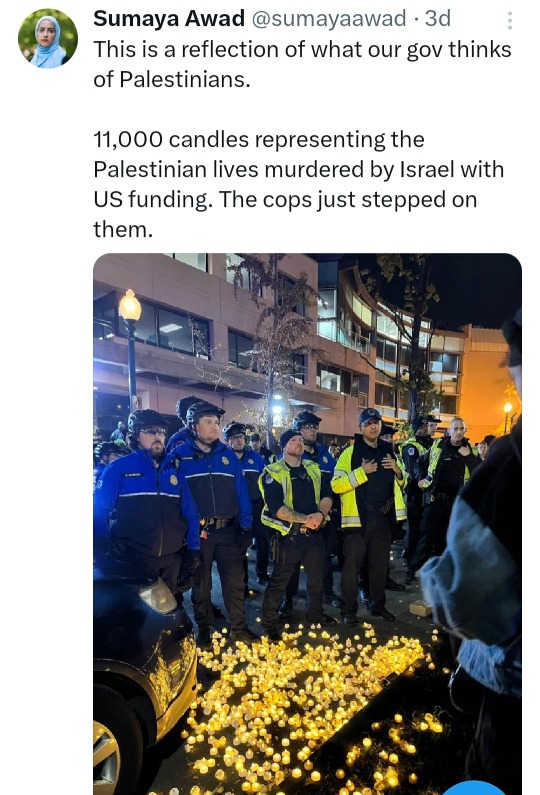

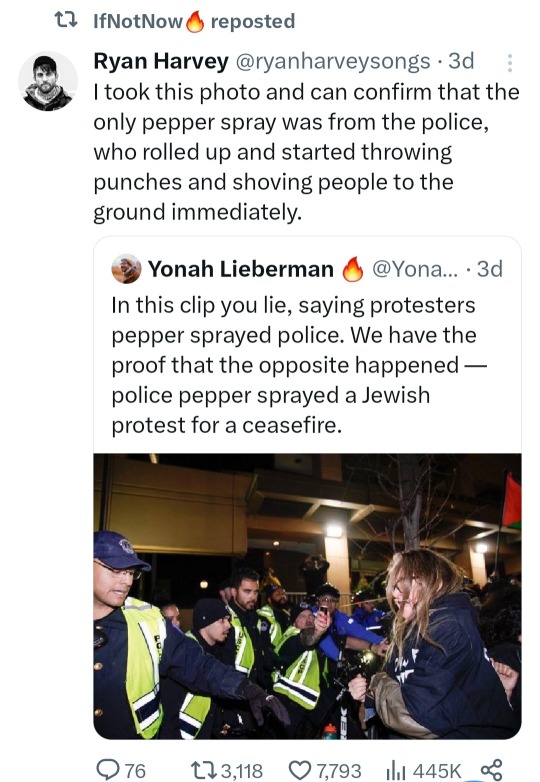

US police throw Jews down stairs, interrupting their peaceful candlelight vigil
Have you called your reps yet?
#usa#american#jewish#the us#social justice#jews for palestine#jewish voice for peace#jewsforpalestine#jews of tumblr#freepalastine🇵🇸#free palestine#gaza#israel#israel is committing genocide#gazaunderattack#protest#palestine solidarity#solidarity#rise of fascism#fascism#call your reps#free gaza#palestine#jewblr
130 notes
·
View notes
Text
Ahem…
Fascism is dictatorship. It is authoritarian, totalitarian, tyrannical
Communism is just rebranded fascism with a committee rather than a dictator
Socialism is just communism-lite
*but it will go full force communism in a very short time
The Nazi party is just rebranded fascism with a socialist take
None of the above are economic systems, or any sort of systems of government. They are simply the very, very few ruling the very, very, very many… and with tech on their side this time, if they are not stopped NOW, there will be no stopping them later
Anarcho-literally-anything will descend very quickly into authoritarianism, totalitarianism… tyranny… and you will not be able to organize quick enough nor effectively enough to stop it
Change my mind…
… and quit playing cute little childish fucking games with our freedom

Angie/Maddie🦇❥✝︎🇺🇸
_____________________________________________________________
extra credit:

#fjb#fascism#communism#socialism#nazi party#Marxism#the end of the human race#treason is not cute#you are not being clever#solo roba di angie#non solo roba da angie#born a witch#vampire#here i am#2a#1a
111 notes
·
View notes
Text

𝔑𝔞𝔭𝔞𝔩𝔪 𝔇𝔢𝔞𝔱𝔥
#napalm death#Grindcore/Death Metal#Themes:Political unrest#Hate#Anti-fascism#Social issues#uk#metal#extreme metal#death metal
103 notes
·
View notes
Text
A U.S.-based research group that specializes in gauging geopolitical risk says Canada is showing signs of the same political contagion and polarization that has afflicted American politics.
The warning is contained in Eurasia Group's annual "Top Risk" report for the new year, released Tuesday.
While Canada does not make the consultancy's "Top 10" in terms of geopolitical or instability risks, the group produced three standalone sub-reports on countries affected by worldwide political turbulence: Canada, Japan and Brazil. [...]
In its analysis, the group sees most of the risk to Canada coming from the political convulsions in the United States — which Bremmer described as the "Divided States of America."
He said the toxic political culture in Washington and throughout the U.S. is spilling across the border and it is likely to get worse in the coming year.
"The media environment in Canada, and the social media environment in Canada is increasingly resembling the media and social media environment in the United States," Bremmer said Tuesday.
"It is dysfunctional. It is rife with disinformation. It is deeply polarized. [The online discourse] is a bunch of people that do not reflect the average Canadian, do not reflect the average American in both countries."
Continue Reading.
Tagging: @politicsofcanada
502 notes
·
View notes
Text
Fighting Back in an Age of Impunity

Its the last essay of the year and the events going on in Gaza - and similar events elsewhere - had me pondering some thoughts for those who may feel powerless and like they can't do anything. It's not perfect, but its something.
Full essay under the cut. Happy Holidays.
I feel like I increasingly start each of these essays with checking on folks and seeing how they’re doing following “the event” – with whatever “the event” is varying depending on what time of the year the essay is occurring in. When I first started thinking about what I may be writing for my last essay of 2023, I thought the worst event I’d have to think about was Azerbaijan’s assault on Artsakh, which resulted in over 100,000 ethnic Armenians fleeing their homes as Ilham Aliyev finally realized his genocidal dream of cleansing the region and forcing it fully into Azerbaijan by force.
Of course, then October 7th happened.
This is not to say that what happened with Artsakh should be forgotten about by any stretch of the imagination. We definitely shouldn’t forget about Armenia and Azerbaijan – especially as Azerbaijan, supported by Turkey, continues to make aggressive statements suggesting it may attack the Republic of Armenia proper in order to secure a corridor to its exclave in Nakhchivan. This is still very important and deserves our attention.
At the same time, if you’ve been following world events at all since October 7th, you kinda know what the most pressing, soul-sucking issue of the moment is. In the weeks since the attacks launched by the Gaza-based Palestinian militant groups – spearheaded by the Islamist political-military movement HAMAS, which largely controls the enclave – Israel has used that unarguable tragedy as an excuse to launch a horrific campaign of violence of its own in revenge, the sheer scale and scope of which has left the Israeli bodycount of October 7th in the dust as more and more Palestinians are killed by the Israel Defense Forces with each passing day – most of them women and children.
I originally was going to shift focus and write something entirely about what’s going on in Gaza, but I was also not sure what more I could say that would be constructive and not simply venting to avoid exploding (something I do on Twitter on a regular basis). I also didn’t want to complete leave Armenia and Azerbaijan in the dust, because I felt there were a lot of parallels between the two situations and their histories (which makes sense since Azerbaijan and Israel have such a cozy relationship, with Israel being one of Azerbaijan’s main arms suppliers in its wars against Armenia and Armenians).
In the end, I decided I wanted to write about something that is more generally going on, and that we’ve seen in Israel’s campaign against Palestinians, Azerbaijan’s campaign against Armenia and Armenians, Russia’s war against Ukraine (which Putin says isn’t ending anytime soon in case you were curious), and other acts of aggression by hostile states and armed groups in what feels like every corner of the globe these days. Everywhere you look, it seems that fascistic states and groups are taking every possible opportunity to try and conquer and kill that which they covet or hate.
We are currently living through what I conceive of as a new “Age of Impunity” in international relations, of which the current assault on Gaza is only one example – though certainly the most egregious and barbaric of the moment. Such ages are not new, and have waxed and waned throughout history, but they all have one core theme in common: during their span, we see a drastic increase in aggression by those states and groups who are determined to hammer home the Thucydidean cliche that “the strong do what they can and the weak suffer what they must.”
But there is a new rub to this tale as old as time. Now, in an age of an increasingly interconnected world via the internet and social media and smart phones and etc., aggressors are not just seeking to prove that might is right, but to gaslight us constantly as they do it, doggedly endeavoring to convince us that this state of affairs is not simply the glib, bleak reality that is allowed to persist in international relations, but is actually good and right and just and fair that those of us that dare question their narrative are insane and sick and even criminal for believing otherwise. To try and add further legitimacy or distance themselves from the acts of information warfare, such aggressors often enlist third parties as well who are aligned to them either ideologically or financially (i.e. they’re paid to).
This combination of consequence free mass violence combined with an aggressive campaign to make you feel insane for not thinking its actually good is enough to make anyone with a moral compass feel actually insane, or to feel incredibly depressed and distraught over it all. Its so easy to feel completely and totally powerless from events such as Gaza and more, boiling over inside with a sense of impotent rage, especially when it seems that all that a key set of individuals and governments would need to do to stop it all – or at least less the impact – is show a modicum of backbone and a slight bit of effort to go along with it, but they don’t.
However, it is important for us all to understand against this backdrop of slaughter, that we are not powerless – not completely. There are limits on our power as “normal” people, absolutely; but we are not totally powerless, and the longer we go on thinking that the longer this Age of Impunity will last – to say nothing of other negative states of affairs we’d rather not stick around. There are actions that we as people can take to try and effect better outcomes. These actions are often indirect, focusing on applying pressure in various forms on those who can actually do something or who can otherwise force someone else to do something, but are none the less impactful and not to be disregarded.
To the end of helping folks not feel powerless in the face of impunity and aggression and giving them a concept through which they can push back on aggression and fascism and authoritarianism worldwide, I’ve crafted an approach of my own. The approach I’ve conceived of is extremely simple, straightforward, broad, long-term and almost certainly incomplete – but a start. So, if the gifts you’re looking to get this holiday season are a shred of hope, a sense of purpose, a modicum of agency, and the ability to actually make an impact upon ongoing global events, let’s open up Santa’s big bag of toys and see what’s inside for all the good little guys, gals, and non-binary pals out there. Ho ho ho.
BLUF: “Don’t Shut Up”
I already warned you that my plan is pretty simple. What I haven’t warned you is that this plan, in a nutshell, may make some people roll their eyes and go “yeah, right, whatever” (or something more impolite), so consider yourself warned of that now.
So, the plan? Don’t shut up.
Ok, obviously this is going to need more expounding upon.
To build upon “don’t shut up” in more detail, the plan is simply to not give up voicing your opposition to the unjustifiable acts of aggression going on throughout the world – whoever it is that is undertaking them, whenever they occur, and wherever they occur. This opposition can come in various forms, be it protests and various other forms of activism and civil disobedience, both physical and virtual, but it really can be boiled down to those three words: don’t shut up. Keep talking – shouting, rather – about what’s going on and don’t let people forget what’s going on.
Not to get defensive right off the bat, but I am anticipating some people reading this feeling a bit disappointed, dismissive (maybe to the point of eye-rolling), or frustrated with this simple approach. So I want to take a little time to push back gently before we get more into the nuts and bolts. I’m going to try and not go on for too long with this because I wrote this earlier and fully made half of the essay me being defensive so be thankful I went back to make this part shorter.
First, to those saying “that’s it?” I would say, ‘yes’; but with the caveat that while its a simple answer, its also a simple problem (which I will get into more detail about later). To those saying “that won’t work,” I would say “based on what?” I feel the problem with that strain of preemptive defeatism, dismissiveness, and doomerism are a uniquely American-centric perspective that is focused only on our own experiences – and also, a very recent and limited view of them. All you need to do is look to the rest of the world to see instances where mass movements that refused to be silenced and maintained pressure accomplished the ousting of various dictators and autocrats (I picked relatively recent examples here, but you can look even further back). I know we’re all tired and demoralized and depressed (hence why I’m writing this), but all you need do is widen the aperture a bit and look beyond our shores to see that things are not as hopeless as they seem. That doesn’t mean that there are quick and easy solutions (something else I’ll get into – we’re in this for the long haul), but again, that doesn’t mean that we are powerless and that our actions mean nothing.
Ok, I got my defensive preemptive pushback on doomerism out of the way and I did it in two paragraphs instead of a page and a half. You’re welcome. So let’s actually get into the nuts and bolts.
Using the potential criticism of “that’s it?” as a starting off point, I will concede again that t his is a very simple approach. But, I would also assert that the activity that this approach is crafted to counter is actually fairly simple in its own right when you think about it. It makes sense that a relatively simple problem demands a relatively simple answer (note that just because the idea is simple doesn’t mean the execution will be quick or easy, but we’ll get to that).
Regardless of the approach or the medium through which they are attempting it, in the information sphere, the ultimate goal of an aggressor to is to silence criticism and to boost its own narratives and supporters. If aggressors can’t coerce or cajole you to their side, they’ll settle for getting you to shut up by whatever means are at their disposal – which is just as good to them; it doesn’t matter if they don’t actually have a lot of popular support at home or abroad, but as long as they can silence dissent and criticism and keep their narrative as the main one, they can just keep on doing what they’re doing.
This can take multiple different forms: drowning you out with torrents of useless, twisted, or outright false information, intimidating you through hostility and harassment, depressing you by making you feel weak and powerless and convincing you that there is absolutely nothing that can stop them (potentially giving you a genuine mental breakdown through their gaslighting), and mental and emotional exhaustion from some or all of what was previously described, just to name a few different methods. These methods may be utilized by the aggressors themselves, or through various allies, partners, and proxies – be they other states and organizations various individuals who are consciously or unconsciously boosting the aggressor’s narratives and attacking the aggressor’s detractors. But the end goal of all of these methods remains the same in every case, but in different guises: to shut you up. If the aggressor’s goal is that simple, it make sense that our response doesn’t need to be that complicated either: deny them their objective by simply refusing to be silenced and, in fact, continuously increasing that pressure.
If information is a domain in warfare, it is probably appropriate to think of your role in it not as a soldier in the army of a peer competitors in a high-end conventional fight. Rather, you should think of yourself as a fighter in an insurgent army, and as this information warfare as an insurgency or rebellion or an uprising rather than the information equivalent of a conventional war (at least not at this stage; we have a few more stages of Mao’s guide to get through first in this analogy). If you conceive of it that way, it can make your task seem even more daunting, but then it also can reveal the inherent advantages that we have in our approach and the challenges it creates for an aggressor trying to manage information.
The Cognitive Insurgency of Attrition
I’ve talked about insurgency and counter-insurgency in the physical domains of warfare before at great length, with my main takeaway being that counter-insurgency is almost always a losing game for whoever is acting as the COIN force. Unless they are prepared to make significant political concessions, they are likely to never win; the best they can ever hope for is to not lose – which will require constant fighting and expenditure of resources of all kinds, indefinitely (something that few countries, even reasonably prosperous and powerful ones, can hope to keep up).
Recalling that takeaway, your advantage and the disadvantage of the aggressor becomes clearer. When I said earlier that really all you have to do is not shut up, I really meant it, because as long as you and others refuse to be gaslit and continue to speak out against particular aggression and injustices, the aggressor is failing at the primary objective they have regarding you. As long as you exist and continue to act and speak out, they will continue to have to expend time and resources to try and counter you. The struggle with the aggressor becomes a battle of wills, and by simply continuing to exist and refusing to be silenced, you are wearing them down in a war of attrition. The more they are worn down, the more likely they are to make mistakes and to show more of their true colors, and the full extent of the horror becomes harder and harder for more and more actors (be they people, organizations, states, and etc.) to ignore and turn a blind eye to, and the pressure mounts to take actual action.
This whole approach and the idea of not shutting up and not giving up is closely tied to another idea, which is that “bullying works” (another thing I originally had in a section unto itself, for another peek behind the curtain, but decided it wasn’t dissimilar enough to separate out). As you refuse to be silenced and continue to speak out and apply pressure, one form of that pressure, is in effect, “bullying.” Basically, making sure that those who are either taking part in various acts of aggression or who are facilitating it or supporting indirectly won’t get a moments peace in their lives as long as they continue to do so. They need to be shown that people will not forget what’s going on and will not go away and will be reminding those who are carrying out out aggression or supporting it at every possible opportunity and be making their lives very difficult for as long as it takes and for as much as it takes until change for the better occurs. Remember kids: bullying by punching down (figuratively), is bad; but bullying by punching up (again, figuratively), is not only good, but necessary for a healthy society!
The inherent downside to this overall approach, of course, is that it is a long-term one. This is not a single battle, but a broader campaign in the wider war against aggression and authoritarianism and fascism. This in its own right may be discouraging to some, but also a bitter pill that must be swallowed. To be perfectly clear: this is not me saying that we shouldn’t bother trying to apply pressure and affect change on issues in the short term. To use our primary example of Gaza once more, we should absolutely be trying in the short term to bring more pressure to bear to bring about a lasting ceasefire and greater humanitarian relief and more in Palestine. However, we’d be deluding ourselves if we believed any action we take right now would suddenly and decisively end the occupation and fundamentally change the political status quo in Palestine in the short term.
As discouraging as this reality can be, it should not dissuade us from taking action, but compel us to gear up for the long fight. Much as the right is willing and able to do with its policy goals at home and abroad, we need to undertake more generational and multi-generational efforts to achieve our aims in all areas – especially when it comes to foreign policy and international relations. Like an actual insurgent force fighting an occupying army or authoritarian regime, we must take a long-term view. This long-term view may encompass short term surges and bursts of activity to achieve specific, tangible, secondary and tertiary goals (like a ceasefire, humanitarian aid, or what have you), but its primary goals and planning must be fundamentally protracted in nature.
Even if you understand, agree with, and accept the protracted nature of this approach, that doesn’t mean it can’t still be demoralizing in the short term. However, there are reasons to be optimistic, because if you look around you can see the signs that this approach is already bearing fruit. In the case of Gaza, you can see signs that the dedication to not “shutting up” about the plight of the Palestinian people on the receiving end of Israel’s military campaign in how the Israeli government and its supporters are either becoming more deranged in their defensiveness for their actions, with some Israeli government officials being increasingly mask off about their genocidal intentions towards Palestinians and their homes, as well as increasingly dismissive towards ideas such as the two-state solution – which governments like that of the United States continue to cling to. We also see this in the reaction of some states supportive of Israel, such as the United Kingdom, where now former-Home Secretary Suella Braverman labeled all pro-Palestinian protesters in the country as “hate marchers” (and was fired from her post not long after that).
In other cases, where governments and groups supporting Israel haven’t gone fully deranged, its becoming increasingly difficult for them to look the other way in the face of Israel’s mask-off violence and aggression. Even as US President Joe Biden continues to stand by Israel doggedly and assert its right to “defend itself”, the administration has internally squirmed at Israeli actions (as well as the potential for escalation). While the administration continues to fruitlessly try and have it both ways (which is fundamentally impossible and only wastes time as more civilians die), the fact that they’re even attempting to do that rather than continue to support Israel wholeheartedly shows that the pressure is mounting. This is born out by polls in the United States that show that support for Palestinians is rising. If aggressors and those running support for them are lashing out or are becoming more desperate in their attempts to control the narrative or silence opposition or even have a leg to stand on in their support, those are signs that the pressure that countless regular people are bringing to bear with their humanity is having an impact. Don’t give up now.
I am once again asking you not to give in to despair
We can’t stop everything going on in the world on our own as individuals, that’s true. And posting alone also won’t stop anything – that’s also true (as much as a lot of us wish it would – or convinced ourselves it will). But we are absolutely not powerless, and we must avoid falling into that trap, or the aggressors win right off the bat.
You are fighting in one particular campaign in a much wider war against aggression and fascism and authoritarianism the world over. There are other fronts that exist now and there will be more in the future – both physical, and virtual. But combat of various sorts (literal and figurative) will be required on all of them in order to achieve successes. It is a collective effort; we are are all in this together, in numerous different ways. To crib a line from the trade union anthem Solidarity Forever: “yet what force on earth is weaker than the feeble strength of one, but the union makes us strong.”
The broader struggle against fascism and aggression will be a long war, and all likelihood, it will likely never end in an absolute victory, and only be one in a series of wars and struggles to come (again, both figurative and literal). As I’ve always said in my writing, part of the reason I’m sure people like me will still have a job even in a better world is because there will always be authoritarian aggressors of some kind who can convince others to fight and die for them in service of their rancid ideology and hatred (hence why I say a “better world” and not a “perfect” one). But even if we there will always be another enemy around the corner in some shape or form, we can set ourselves up to be stronger, smarter, more united, more compassionate, and better prepared for the additional struggles and wars ahead.
I’d be remiss if I didn’t point out that everything I just talked about isn’t exclusively for responding to acts of aggression abroad, but is perfectly applicable at home as well. The approach that I’ve laid out can be applied to fascist aggressors of the domestic political variety, just as much as they can be applied to aggressor states and groups overseas engaging in armed aggression. In the United States in particular, we face an ever increasing war from within. Even if the political crisis in the United States doesn’t escalate to the level of a full scale civil war (something that I certainly don’t want, that I imagine most sane people don’t want, and something we should all work to avoid), we still find ourselves in an American Years of Lead situation at bare minimum that will very likely only get worse as we approach the 2024 election. Again, we can see some promising signs that these approaches are actually working, from the progressive gains that have been made in recent off-year elections on matters such as abortion, legalization of marijuana, and other progressive causes – many of which have been in response to right-wing forces doubling down on their extreme positions in desperation as normal people increasingly point out and deride their “sicko” behavior and refuse to let it go unanswered.
However, as heartening as these victories are, polling shows that the 2024 election is looking increasingly fraught, and nothing should be taken for granted in the eleven months that remain before election day 2024 – especially as former-President Donald Trump has been perfectly blunt about what his plans are if he makes it back into the White House (to say nothing of the coterie of other sickos and chuds that he will put into positions of power in his administration if he wins). While far from the only tool at your disposal, the approach I have laid out previously for pushing back on the narratives of fascism, authoritarianism and aggression abroad may very well make a real difference in the rhetorical and political battles against those same insidious forces at home. Keep that in mind on the road to November 5th, 2024 (or, if you live outside the United States, to road to whatever political battles you have to face in the near future).
We live in particularly bleak times in general, there’s no arguing that. This current Age of Impunity we find ourselves in has no shortage of dictators, tyrants, and fascists who are eager to take advantage of global instability and shifting geopolitics to take things they’ve long coveted, settle scores and seek revenge, and carry out a laundry list of other heinous acts. But even in those acts of aggression, we can find hope. For example, in Myanmar, a diverse coalition of varied ethnic groups – spearheaded by young people – are pushing the fascist junta back on its heels in that country’s civil war. While their battle is far from over, the progress they’ve made in recent weeks since launching a new offensive against the junta has been remarkable. Wherever we can, we need to grab onto examples of maintaining persistence, applying pressure, and not giving up hope – whether its on literal battlefields, or political and ideological ones. We need to take the progress and victories where we can, to remind us why we’re doing any of this at all: because we believe a better world is not only possible, but necessary and inevitable.
It is on that note, I leave you on this last essay of 2023. I’ll be back with another by mid-March at the absolute latest for the first essay of 2024 (God only knows what I’ll be writing about by then, but we’ll see where Mr. Bones’ Wild Ride takes us all). For those of you who are celebrating, I wish you a Merry Christmas and a Happy Holiday Season, and also a Happy New Year to you all. Please, wherever and whenever you’re able, even while you all try to keep up the struggle, try to find some time to rest and be kind to yourself because we all need that.
See you in 2024. Stay safe.
#War Takes#essay#War Takes essay#leftism#leftist#the left#socialism#democratic socialism#international relations#war#warfare#fascism#anti fascism#Palestine#Gaza#Israel#Palestinians#international affairs#information warfare#HAMAS
58 notes
·
View notes
Text
Anyway this is an unpopular opinion on social media but it really shouldn’t be: aesthetics-as-politics is one of the scourges of our time. Do not misread me. I am not saying that everyone who (eg) enjoys cute cottagecore posts is a terf or a tradwife, nor am I singling out any one particular aesthetic as the natural home of reactionaries. I am saying that ANY time you see somebody get really into Political Aesthetics - whatever the aesthetic - it should at the very least set your spidey senses tingling, because fascists were and are the absolute kings of that shit. I am saying that (maybe especially in our time and on social media) heavy aestheticization is advertising, and advertising is selling you something
37 notes
·
View notes
Text

#communism#socialism#leftism#anti capitalism#class consciousness#class conflict#capitalism#communist#leftist#socialist#antifascism#marxism#anti capitalist#imperialism#colonialism#military industrial complex#western imperialism#us imperialism#american imperialism#anti fascism#fascism#fascisim#fascist#class struggle#classwar#class war#fuck capitalism#wealth inequality
582 notes
·
View notes
Text
September 11, 1973: On the 50th Anniversary of the Coup in Chile
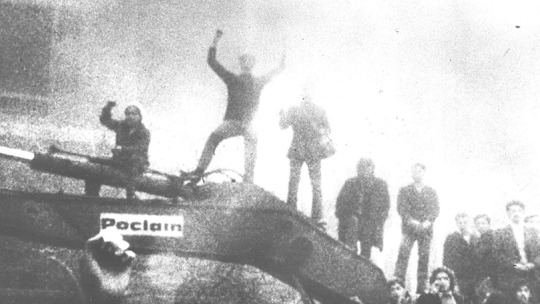
Today marks the 50th anniversary of the coup d’état in Chile, when a fascist junta led by dictator Augusto Pinochet overthrew the democratically elected socialist government of Salvador Allende. For those of us who are on the left, the story should be familiar by now: Allende had charted a ‘Chilean way to socialism' ("La vía chilena al socialismo") quite distinct from the Soviet Union and communist China, a peaceful path to socialism that was fundamentally anti-authoritarian, combining worker power with respect for civil liberties, freedom of the press, and a principled commitment to democratic process. For leftists who had become disillusioned with the Soviet drift into authoritarianism, Chile was a bright spot on an otherwise gloomy Cold War map.
What happened in Chile was one of the darkest chapters in the history of US interventionism. In August 1970, Henry Kissinger, who was then Nixon’s national security adviser, commissioned a study on the consequences of a possible Allende victory in the upcoming Chilean presidential election. Kissinger, Nixon, and the CIA—all under the spell of Cold War derangement syndrome—determined the US should pursue a policy of blocking the ascent of Allende, lest a socialist Chile generate a “domino effect” in the region.
When Allende won the presidency, the US did everything in their power to destroy his government: they meddled in Chilean elections, leveraged their control of the international financial system to destroy the economy of Chile (which they also did through an economic boycott), and sowed social chaos through sponsoring terrorism and a shutdown of the transportation sector, bringing the country to the brink of civil war. Particularly infuriating to the Americans was Allende’s nationalization of the copper mining industry, which was around 70% of Chile’s economy at the time and was controlled by US mining companies like Anaconda, Kennecott and the Cerro Corporation. When the CIA’s campaign of sabotage failed to destroy the socialist experiment in Chile, they resorted to assisting general Augusto Pinochet's plot to overthrow the democratically elected government. What followed was a gruesome campaign of repression against workers, leftists, poets, activists, students, and ordinary Chileans—stadiums were turned into concentration camps where supporters of Allende’s Popular Unity government were tortured and murdered. During Pinochet’s 17-year reign of terror, 3,200 people were executed and 40,000 people were detained, tortured, or disappeared, 1,469 of whom remain unaccounted for. Chile was then used as a laboratory for neoliberal economic policies, where the Chicago boys and their ilk tested out their terrible ideas on a population forced to live under a military dictatorship.
It shatters my heart, thinking about this history. I feel a personal attachment to Chile, not only because my partner is Chilean (his father left during the dictatorship), but because I’ve always considered Chile to be a world capital of poetry and anti-authoritarian leftism. The filmmaker Alejandro Jodorowsky asks, “In how many countries does a real poetic atmosphere exist? Without a doubt, ancient China was a land of poetry. But I think, in the 1950s in Chile, we lived poetically like in no other country in the world.” (Poetry left China long ago — oh how I wish I’d been around to witness the poetic flowering of the Tang era!) Chile has one of the greatest literary traditions of the twentieth century, producing such giants as Bolaño and Neruda, and more recently, Cecilia Vicuña and Raúl Zurita, among others.

To commemorate the 50th anniversary of the coup, the Harvard Film Archive has been screening Patricio Guzmán’s magisterial trilogy, The Battle of Chile, along with a program of Chilean cinema. I watched part I and II the last two nights and will watch part III tonight. It’s no secret that I am a huge fan of Guzmán’s work, and even quoted his beautiful film Nostalgia for the Light in the conclusion of my book Carceral Capitalism, when I wrote about the Chilean political prisoners who studied astronomy while incarcerated in the Atacama Desert. Bless Patricio Guzmán. This man has devoted his life and filmmaking career to the excavation of the Chilean soul.
Parts I and II utterly destroyed me. I left the theater last night shaken to my core, my face covered in tears.


The films are all the more remarkable when you consider it was made by a scrappy team of six people using film stock provided by the great documentarian Chris Marker. After the coup, four of the filmmakers were arrested. The footage was smuggled out of Chile and the exiled filmmakers completed the films in Cuba. Sadly, in 1974, the Pinochet regime disappeared cameraman Jorge Müller Silva, who is assumed dead.
It’s one thing to know the macro-story of what happened in Chile and quite another to see the view from the ground: the footage of the upswell of support for radical transformation, the marches, the street battles, the internal debates on the left about how to stop the fascist creep, the descent into chaos, the face of the military officer as he aims his pistol at the Argentine cameraman Leonard Hendrickson during the failed putsch of June 1973 (an ominous prelude to the September coup), the audio recordings of Allende on the morning of September 11, the bombing of Palacio de La Moneda—the military is closing in. Allende is dead. The crumbling edifice of the presidential palace becomes the rubble of revolutionary dreams—the bombs, a dirge for what was never even given a chance to live.
#Patricio Guzmán#film#Chile#history#salvador allende#socialism#marxism#coup#coup d'etat#The Battle of Chile#revolution#cinema#fascism#communism#geopolitics#political economy#Cold War#chris marker#memory#neoliberalism#capitalism#politics
97 notes
·
View notes
Text
I am by no means an expert but it seems to me “your body does not belong to you” is a major theme of right wing authoritarianism and, interestingly, modern USAmerican thinking. This underpins so much from abortion to forcing kids to hug their relatives. Your body belongs to the state, or God, or your husband, or your boss, or your doctor. Everything from trans and gay liberation to forcing autistic people to look in your eyes to making cashiers stand for no reason. Your body does not belong to you, but taking care of your body is your responsibility and your responsibility alone, and if you fail in some way, you deserve the consequences.
#Socialism#The far right#rwa#authoritarianism#right wing authoritarianism#My body my choice#trans rights#Gay rights#christian fascism#Actuallyautistic#actually autistic#body autonomy#Some will agree with me but#When I bring up#Child liberation#and fat acceptance#Now all of a sudden I’m going too far
516 notes
·
View notes
Text

AS POSTED AROUND EIGHT MINUTES AGO BISAN IS CONFIRMED TO BE ALIVE, ALHAMDULILLAH
She was displaced for 24 hours and survived the bombing at Al Shifa'a Hospital
#yupyupyup#palestine#free palestine#gaza#gaza strip#west bank#social justice#bisan owda#free gaza#end israeli apartheid#free palestine from apartheid#free palestine from colonialism#anti zionism#anti fascism#end israeli occupation#dissolve the israeli government
87 notes
·
View notes